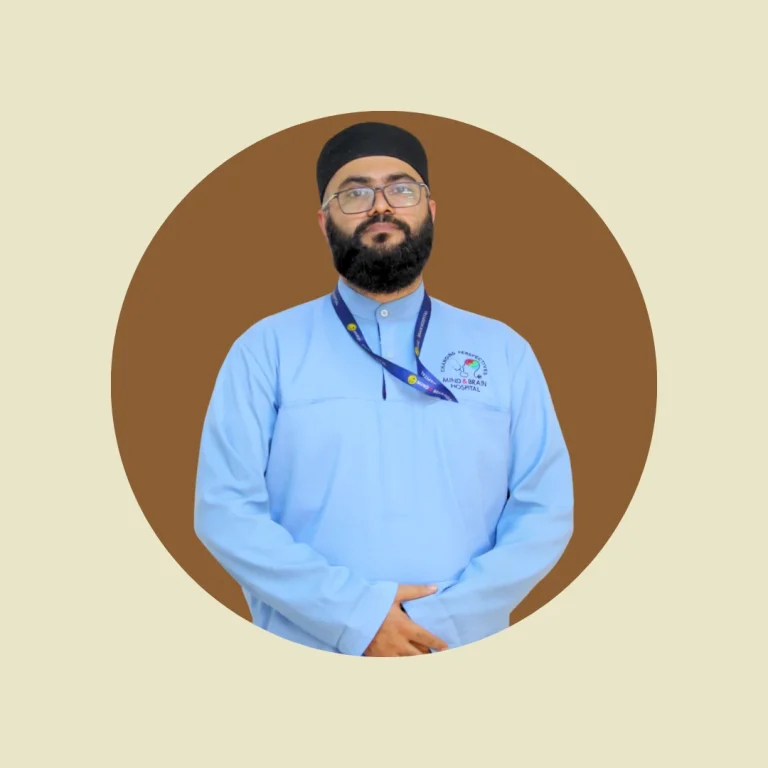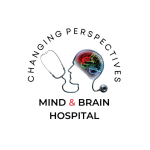ISLAMIC PSYCHOLOGY
Embarking on a journey marked by faith and dedication, our department stands as a beacon of hope in the realm of mental health. Guided by a profound sense of purpose and fueled by a commitment to serving our community, we are humbled by the opportunity to pioneer the integration of Islamic psychology into clinical practice. As the first clinical setup in the world and in India to establish a dedicated department of Islamic psychology, we have traversed uncharted territory, accumulating over 600 collective hours of practice and providing support to more than 200 clients.
psychology.
Our journey thus far has been characterized by resilience, innovation, and unwavering faith. We remain deeply grateful to the Almighty for His guidance and to each individual who has entrusted us with their well-being. Yet, we are acutely aware that our work is far from complete. There are countless individuals who continue to grapple with mental health challenges, yearning for healing and understanding.

Introduction to Islamic Psychology
The International Association of Islamic Psychology defines Islamic Psychology as the Psychology that is based on an Islamic paradigm. The Islamic paradigm is a perspective that encompasses rules, norms, and values that apply to all aspects of human life, let it be personal I.e. cognition, emotion, behavior, physiological and spiritual as well as collective I.e. social, political, economical, etc.
Islamic paradigm sees human nature holistically which includes Nafs, Qalb, Aql and Ruh as well giving consideration to the existing psychological literature and practices related to the bio-psycho-social-spiritual model of perceiving human nature. It offers an alternative approach to understanding human behavior and mental health by drawing premise from the Divine Revelation, I.e. Quran and a Sunnah, referring to the works of Islamic intellectual and spiritual heritage as well as studies in contemporary psychology.
History of Contemporary founder of Islamic Psychology
Dr. Malik Badri
Professor Malik Badri (16 February 1932 – 8 February 2021) is the Father of Contemporary Islamic Psychology
Born in Sudan, he earned a B.A. and Masters from the American University of Beirut, followed by a Ph.D. from the University of Leicester, England, and a Postgraduate Certificate of Clinical Psychology from Middlesex Hospital Medical School, London University. He became a Fellow of the British Psychological Society and a Chartered Psychologist. Recognized with honors including an honorary D.Sc. from Ahfad University and the Shahid Zubair medal, he held various academic roles, including Dean positions at the University of Khartoum and Juba University. Additionally, he served as a senior clinical psychologist in the Middle East and Africa, founding the Psychological Clinic at the University of Riyadh, Saudi Arabia. He occupied the prestigious Chair of Ibni Khaldun at the International Islamic University, Malaysia.
Indian History of the field of IP:
Indian council on the Islamic perspective in psychology (ICIPP) was established in 2016 in India. Three seminars (two international) and several workshops have been organized in India under the ICIPP banner to debate and exchange ideas about this evolving field. Moreover, the optional papers of Islamic psychology are included in the syllabi of Psychology recommended for Indian universities and colleges as a model syllabi by the University Grants Commission (UGC) of India.
Indian Contemporary Frontiers:
Dr. Akbar Husain, a Professor at Aligarh Muslim University, has over 41 years of experience in teaching and research. He holds a Ph.D. in Psychology and a D.Litt. for his work on spirituality in psychology. With numerous publications, supervision of theses, and contributions to conferences, he’s recognized internationally. Dr. Husain’s research interests include spiritual psychology, Islamic psychology, clinical health psychology, and more. He received the Sir Syed Innovation Award 2018 for Outstanding Researcher of the Year.
Naved Iqbal, currently a Professor at the Department of Psychology, Jamia Millia Islamia, New Delhi, has been a dedicated educator since 1994. With a focus on health psychology, clinical psychology, and spirituality from an Islamic perspective, he has contributed significantly to research in these areas. Dr. Iqbal’s research also delves into Islamic psychology, exploring unique epistemological paradigms that integrate Islamic principles with contemporary psychological theories and methodologies. His scholarly endeavors highlight a commitment to advancing psychological knowledge and practice while embracing the rich insights offered by Islamic tradition. Additionally, Naved has chaired numerous conferences and authored multiple papers, showcasing his multidimensional contributions to the field of psychology.He previously served as a head of ICIPP and possesses a strong grasp of Islamic psychology, encompassing research and epistemological paradigms within the field.
Azizuddin Khan is a distinguished academic currently serving as a Professor at the esteemed Indian Institute of Technology, Bombay. With a tenure spanning over 16 years at the institute, he has made significant contributions to the field of Psychology and research.
Beyond his academic responsibilities, Azizuddin Khan has demonstrated a keen interest and proficiency in the realm of Islamic psychology. He has been one of the founding members of ICIPP which underscores his deep understanding and engagement with Islamic psychological principles, research methodologies, and epistemological paradigms.
Other founding members:
– Prof. Roomana N. Siddiqui – Position: Professor
– Affiliation: Department of Psychology, Faculty of Social Sciences, Aligarh Muslim University
– Dr. Nazirul Hasnain (Retd.)
– Position: Retired Professor
– Affiliation: Department of Psychology, Jamia Millia Islamia, New Delhi
– Prof. Shamin Ansari
– Position: Retired Professor
– Affiliation: Department of Psychology, Faculty of Social Sciences, Aligarh Muslim University
– Prof. M Hafiz Ilyas Khan
– Position: Former Chairperson
– Affiliation: Department of Psychology, Faculty of Social Sciences, Aligarh Muslim University
– Dr. Khurshid Alam
– Position: Associate Professor
– Affiliation: Department of Psychology, Zakir Husain Delhi College
– Nahid Nizami
– Position: Professor
– Affiliation: Department of Psychology, Faculty of Social Sciences, Aligarh Muslim University
He established The International Association of Islamic Psychology (IAIP) in 2017, aiming to enhance Islam’s role in advancing health and human understanding while promoting Islamic psychology as a theoretical framework in clinical psychology. Joining Istanbul Sabahattin Zaim University in 2017 as a psychology professor and serving as a visiting lecturer at the International Open University, he continued his academic pursuits until his passing. He died on February 8th, 2021 in Malaysia. A prolific author, his works in psychology and education have been translated into numerous languages across the Islamic world. His research interests span psychology, clinical psychology, cognitive behavior therapy, Islamic psychology, social psychology, and Islamic studies.
Meet our team
At our organization, we believe in a comprehensive approach to mental health and well-being deeply rooted in Islamic principles. Our team, co-led by the experienced and dedicated Zulekha Shakoor Rajani, is committed to providing holistic support to individuals seeking spiritual and emotional growth.
Shujauddin Fahad

As a Research Scholar, Therapist Practitioner, and Mental Health Educator, Shujauddin Fahad Inamdar brings a wealth of experience and expertise to our organization. With a Master’s degree in Clinical Psychology and a specialization in Islamic Psychology, Shujauddin is deeply invested in leveraging psychological principles to promote spiritual growth and resilience. His commitment to continuous learning is reflected in his pursuit of certifications in Cognitive Behavioral Therapy (CBT), Rational Emotive Behavior Therapy (REBT), and Neuro-Linguistic Programming (NLP), enhancing his ability to provide comprehensive therapeutic interventions.
Professional Accomplishments:
Shujauddin’s career is marked by a diverse range of accomplishments, spanning research, education, and community outreach. From his role as a Spiritual Psychologist at Mind and Brain Hospital to his tenure as a Research Associate and Coordinator at the Centre for Study and Research in New Delhi, Shujauddin has consistently demonstrated a dedication to advancing knowledge and practice in the field of Islamic psychology. His contributions extend beyond clinical settings, as evidenced by his involvement in social impact assessment and auditing projects, aimed at evaluating the efficacy of mental health interventions within communities.
Education and Training:
Shujauddin’s academic journey underscores his commitment to excellence and innovation in the field of psychology. With a Master’s degree in Clinical Psychology from Rashtrasant Tukdoji Maharaj Nagpur University, supplemented by specialized courses in Islamic Psychology and Psychotherapy, Shujauddin has acquired a strong foundation in psychological theory and practice. His training in data analysis and statistics, coupled with his proficiency in SPSS and Excel, equips him with the tools necessary to conduct rigorous research and derive meaningful insights.
Research and Projects:
Shujauddin’s research endeavors are characterized by their relevance and impact on contemporary issues facing society. From studying the attitudes of youth towards love to exploring the role of religiosity in mitigating anxiety, his projects offer valuable insights into the intersection of faith and psychology. Of particular note is his longitudinal participatory action research with Muslim students, which seeks to develop culturally sensitive counseling models tailored to the needs of diverse communities.
Personal Details:
Born and raised in Nagpur, Maharashtra, Shujauddin embodies a rich cultural heritage and a deep-rooted commitment to serving the community. Beyond his professional pursuits, he finds fulfillment in mentoring youth, conducting workshops on Islamic psychology, and providing psychotherapy services from an Islamic perspective. Multilingual and well-traveled, Shujauddin possesses a keen understanding of linguistic and cultural diversity, fluently speaking English, Urdu, Hindi, and Arabic.
Shujauddin Fahad Inamdar and our team are dedicated to promoting Islamic psychological wellness through evidence-based practice, compassionate care, and community engagement. We invite you to join us in our mission to cultivate resilience, foster growth, and nurture spiritual well-being in individuals and communities alike.
Teaching, Training and Internship
The Internship is organized into distinct phases, regardless of its duration, whether spanning days, weeks, or months.
Phase 1
- Orientation and Introduction
- Familiarization with Hospital Structure
Phase 2
- Introduction and working with Multidisciplinary Team (MDTs)
Phase 3
- Clinic and Ward Exposure
Phase 4
- Educational Components and Modalities Observation and Introduction
Phase 5
- Integration of Theoretical Orientations and Practical Interventions of Islamic Psychology
Phase 6
- Integration and Professional Development
Phase 7
- Administrative Aspects and Quality Improvement Feedback
Throughout the internship, the intern will have regular check-ins with the team and supervisors to discuss observations, address questions, and refine goals for the upcoming week or days if any. The focus of this initial week is to provide a broad overview and foundation for the intern’s subsequent involvement in the clinical aspects of Islamic psychology within the healthcare setting.
